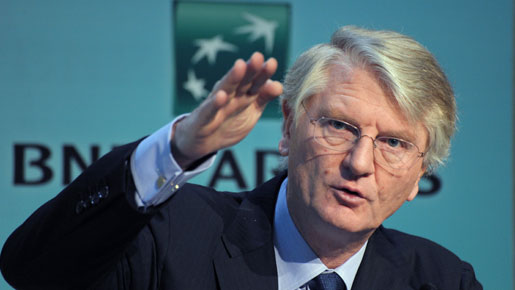
Born in 1951, Baudouin Prot finished his academic career by graduating from the HEC Paris and the École Nationale d’administration. Baudouin Prot entered BNP in 1983, where he held the positions of Deputy Managing Director of BNPI (Banque Nationale de Paris Intercontinentale) from 1983 to 1984, Executive Vice-President in charge of the European Division of BNP from 1984 to 1987 and Executive Vice President in charge of the French Retail Banking Services of BNP in 1987.
He was appointed Senior Executive Vice-President in 1990, Head of the BNP Domestic Banking Division in January 1992 and Deputy Managing Director of BNP SA in July 1992. Before taking his responsibilities at BNP, Baudouin Prot worked in the French civil service as Deputy Head of the Prefect Office of Franche-Comté, one of the 21 French administrative districts (1974), Finance Inspector – French Treasury (1976-1980) and Deputy Head of the Energy and Commodities Division – French Ministry of Industry (1980 – 1983).
Prot’s tenure in the higher ranks of BNP Paribas is categorised by two clear strategies; select strategic acquisitions and maintaining a healthy balance between investment and retail banking. In terms of M&A, in 1999, as Director of Operations, Prot led the merger process between BNP and Paribas. As a result of the deal BNP Paribas serves some six million French households and caters for 60,000 corporate clients.
No stranger to awards, in 2006 Prot was named ‘Financier of the Year’, principally in recognition of the successful acquisition of Italian bank Banca Nazionale del Lavoro, which was conducted in a record time, providing BNP Paribas with a second retail market in Europe. In 2007 Prot also picked up the ‘Social and Corporate Responsibility’ award by the Foreign Policy Association (FPA). Noel Lateef, President and CEO of the FPA said at the time that the reason for Prot being handed the award was for the extraordinary efforts of BNP Paribas and its employees in the aid and services provided to the victims of Hurricane Katrina in Louisiana and the corresponding areas.
Banking crisis
BNP Paribas fared better than many other firms in the financial crisis. Under Prot’s strategy of maintaining a balance between retail and investment banking, it suffered relatively little from exposure to subprime loans. And the analysts agree. ‘BNP Paribas is one of the winners of the crisis,’ said Jaap Meijer, a London-based analyst at Evolution Securities. ‘BNP Paribas has no issues with toxic assets, it’s extremely well covered for bad loans and it’s well capitalised.’
As a result of this healthy position, in September 2009 the bank announced that it was to buy back the stake taken by the French government in the midst of the global financial crisis, by launching a €4.3bn rights issue. The bank is to use the proceeds of the rights issue, together with other funds, to repay the French state for the €5.1bn in shares it bought in the bank, thus becoming the first European bank to repay a government.
Prot has been quoted as saying that the refinancing plan is expected to boost earnings per share by 8.4 percent in 2010. Not that the bank’s results were looking too shabby anyway. In Q3 2009 the bank posted profits of €1.3bn, a substantial (45 percent) improvement on the third quarter the previous year, but slightly down on the Q2 2009 net profits of €1.6bn. Revenues were also up by 40 percent from Q3 2008 to €10.7bn, and gross operating income rose by 55 percent to reach €4.6bn.
With such excellent results you can almost forgive Baudouin for his smugness. Commenting on the decision to repay the government’s stake, he said, “We are now able to raise equity in the market at terms that I think are more favorable to our shareholders than borrowing from the state. As BNP Paribas has been weathering the crisis, one of the strongest in Europe, it was natural for BNP Paribas to go first.”
BNP Paribas, like US-based JPMorgan Chase, has wisely used the banking crisis to its advantage by actively seeking acquisitions of its struggling competitors. In 2009 BNP Paribas became the biggest by deposits in the euro region with the €10.4bn purchase of Fortis’s banking units in Belgium and Luxembourg, giving BNP a 75 percent shareholding in the group and establishing the bank as the largest bank in Europe in terms of total assets and second largest by market capitalisation.
Having not only survived, but having come through the worst financial crisis the world has ever seen smelling of roses, BNP Paribas has a lot to thank Baudouin Prot for. At the same time rival banks could do a lot worse than looking to BNP as a model of balanced banking strategies. “The idea that some financial institutions are too big to be allowed to fail is wrong,” said the chief executive. “Whatever your size, it’s the nature of certain activities that puts you at risk.”
Starting the new decade
Overall, BNP Paribas performed better than most of their competitors during the economic downfall, primarily due to its duel strategy of focusing on both retail and investment banking and therefore protecting itself from exposure to subprime loans.
With the affirmation that their refinancing plan could boost each share by an impressive 8.4 percent in 2010 it is no wonder that the shareholders are looking forward to another prosperous decade.
For this reason the Corporate and Investment bank has launched their ‘Embrace the Future’ program, where the bank establishes their commitment to innovative thinking and maintaining a regular cash-flow stimulus. “We take the client to the near future, one bright with promise, with opportunity, and CIB is there with new ideas and solutions, at the client’s fingertips,” quotes their advertising campaign. And with a booming profit of €3.1bn during the worst economic crisis since the 1920s, who can doubt the potential worth of investing in the white knight of the banking sector.

